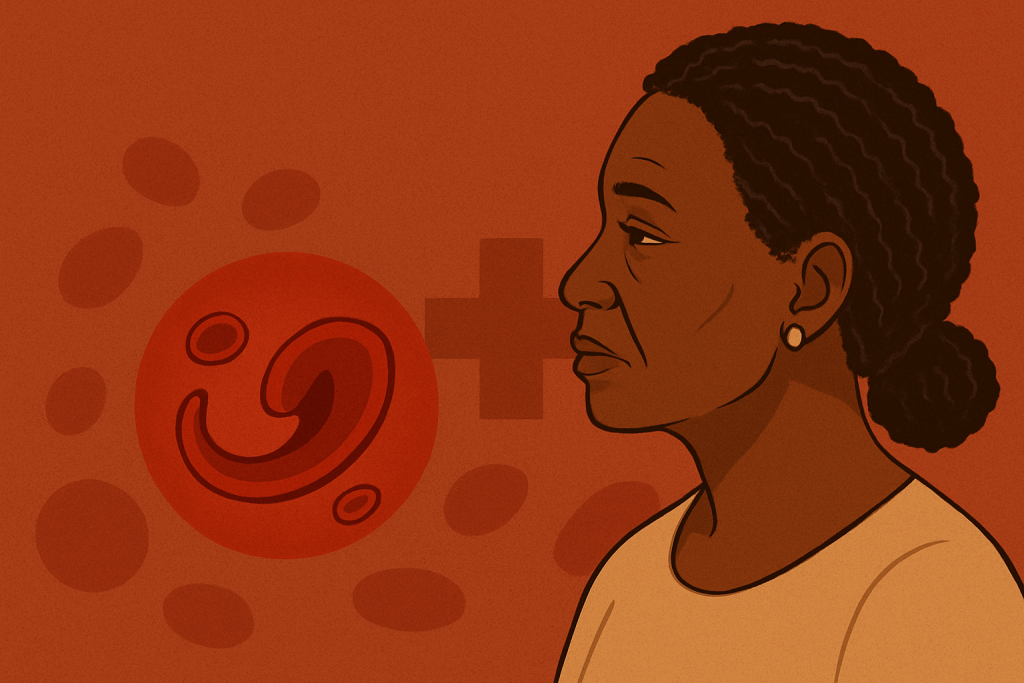
Sickle cell disease (SCD) is often thought of as a childhood condition, but many in the Black community—particularly older adults—continue to live with its long-term effects. Advances in treatment have extended life expectancy for people with SCD, yet the burden of the disease on older generations remains significant.
Understanding Sickle Cell Disease
Sickle cell disease is a genetic blood disorder in which red blood cells, normally round and flexible, take on a crescent or “sickle” shape. These misshapen cells break down faster and can block blood flow, leading to anemia, severe pain episodes, and organ damage. SCD primarily affects people of African descent, with about 1 in 365 Black or African American births carrying the disease and 1 in 13 carrying the trait.
Why Older Generations Are Affected Differently
In the past, many people with SCD did not live into adulthood due to limited treatment options. As medical care improved—through antibiotics, blood transfusions, and newer therapies like hydroxyurea—more individuals began living well into middle and older age. However, this progress comes with new challenges.
For older adults, decades of living with sickle cell crises and related complications can lead to: Organ damage – long-term strain on the kidneys, liver, and heart. Chronic pain with worsening bone and joint problems from years of blocked blood flow. Stroke and cognitive decline in older adults with SCD may face increased risks of silent strokes, memory issues, and difficulty concentrating. Lastly, reduced mobility and independence – Frequent hospitalizations and fatigue make everyday life harder to manage.
The Community and Cultural Impact
For the Black community, SCD is more than a medical condition—it is a generational health issue. Many older adults living with the disease grew up at a time when awareness and treatment were far more limited. This means they may have endured stigma, inadequate care, and lack of support.
Today, these older generations often serve as caregivers, community leaders, and sources of wisdom for younger family members. But their health struggles can affect entire households—especially in families where grandparents help raise children. The burden of SCD can also deepen economic and social inequalities, as frequent hospital visits and chronic health problems make it harder to work, save, or access consistent healthcare.
Moving Forward: Supporting Older Adults with Sickle Cell
As more people with SCD live longer, healthcare systems must shift focus to include the unique needs of older patients. This includes: Comprehensive care – Regular screenings for organ health, mental health support, and tailored pain management. Community resources – Support groups, advocacy, and culturally informed care that address the lived experiences of older Black adults. Education – Increasing awareness about how SCD affects aging, so families and caregivers can better support loved ones.
Conclusion
Sickle cell disease continues to have a profound impact on the Black community, and its toll on older generations is often overlooked. By acknowledging their struggles and ensuring they receive comprehensive, compassionate care, we can honor the resilience of those who paved the way for today’s medical advances—while improving quality of life for the future.
Trending Topics
Features
- Drive Toolkit
Download and distribute powerful vaccination QI resources for your community.
- Health Champions
Sign up now to support health equity and sustainable health outcomes in your community.
- Cancer Early Detection
MCED tests use a simple blood draw to screen for many kinds of cancer at once.
- PR
FYHN is a bridge connecting health information providers to BIPOC communities in a trusted environment.
- Medicare
Discover an honest look at our Medicare system.
- Alliance for Representative Clinical Trials
ARC was launched to create a network of community clinicians to diversify and bring clinical trials to communities of color and other communities that have been underrepresented.
- Reducing Patient Risk
The single most important purpose of our healthcare system is to reduce patient risk for an acute event.
- Victor Mejia
- Victor Mejia


















